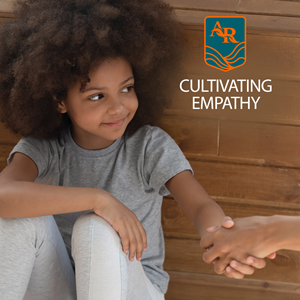
Empathy is a powerful tool that can be used to build connections in educational, vocational, professional, and personal relationships. It’s usefulness is truly invaluable. Not only can developing empathy make children better-adjusted members of society, but it’s an important human emotion to develop simply for the greater good of our own mental health.
Empathy differs from sympathy in that sense sympathy is more inline with understanding why someone would feel the way that they do. Empathy is feeling other people’s emotions. Simply put, sympathy is more cognitive and superficial while empathy is more emotional and drives deeper human connections. Developing empathy takes time. It’s not necessarily a naturally acquired ability, nor is it something that can be quickly learned in a few simple activities. Empathy is a psychological process that’s often built on a series of experiences, but you can help your child harness their full empathic abilities.
Give Children The Tools They Need To Develop Self-Regulation
Life can be an emotional roller coaster and learning how to cope with and regulate those emotions – high and low – is essential to achieving long term successes. Provide your child with a safe place to discuss their emotions as they navigate all of life’s ups and downs. Children who are capable of managing their negative emotions tend to be more understanding and empathetic towards others. You can help them achieve this by acknowledging their challenging emotions and have conversations about the cause and effect of those emotions. This helps them learn to feel secure and gives them the confidence to branch out socially and emotionally. It also helps them build their own emotional resilience that can then be modeled for others.
Give Your Child Opportunities To Apply Their Empathy
Using empathy in real life situations isn’t as difficult as you may believe. Sometimes this looks like simply asking the question, “What would you do?” Posing this question along with a challenging scenario helps children learn to see things from another person’s perspective. Sometimes children may need a gentle reminder about how actions (or inactions) can make others feel.
Help Children Develop An Internal Sense of Morality and Integrity
Children can oftentimes become motivated by external reward rather than internal satisfaction. Children can become less likely to help others over time if they’re given a reward for doing it. They’re more likely to develop a greater sense of moral integrity when parents explain how their actions can be hurtful to others. This typically looks like discipline that is grounded in moral consequences and rational explanations rather than stringent rules that are arbitrary based on the situation and not in direct correlation to helping the child understand the effects of their actions.
Above all else, make it your mission to set caring for others as a high priority. Allowing your child the privilege of growing up in a home where compassion and understanding is at the root of your family’s belief system is a perfect way for them to experience the true power of empathy firsthand.
